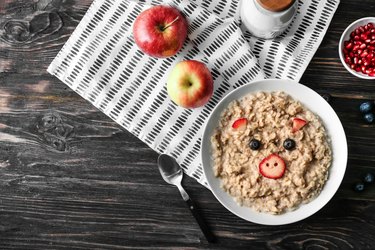
Running a half marathon is quite an accomplishment, one that requires discipline, dedication and rigorous training. And providing your body with the proper fuel is essential for you to run your best race.
The foods you choose to eat on race day are very important, but your diet in the days or even weeks before the event matters. There's a lot that goes into what to eat before a half marathon and the foods you pick can make or break your performance.
Video of the Day
Video of the Day
Your Fuel Leading Up to a Half Marathon
The several days prior to running a half marathon are no time to limit your calorie or carbohydrate intake. The meal you eat the morning of the race alone (more on that below) can't provide you with enough energy, so you'll definitely have to use some that's stored up.
Your body stores carbs as glycogen to use when it's running on empty, according to the American Council on Exercise (ACE). To build up your glycogen stores for race day, bump up your calorie and carb intake the week prior to the marathon. Your goal should be to consume 55 to 60 percent of your calories from carbohydrates, or 3 to 5 grams per pound of body weight.
The Days Before the Race
During the days leading up to your race, focus on including plenty of complex carbohydrates in your diet. Complex carbohydrates can help provide the energy you need to perform. Try to incorporate a few of these foods into your daily diet:
- Whole-grain bread
- Whole-grain pasta
- Rice
- Potatoes
- Legumes
But don't go overboard with carb loading, according to Penn Medicine. Try a half marathon meal plan that looks something like this:
- Breakfast: oatmeal with fruit and nuts or an English muffin with peanut butter and banana
- Lunch: shredded beef burrito with rice and beans
- Dinner: pasta with grilled chicken and roasted veggies or chicken and vegetable stir-fry with steamed rice
- Snacks: yogurt with fruit and granola, crackers and cheese, or half a sandwich
What to Eat the Day Before Your Half Marathon
Like the morning of your half marathon (more on that below), you don't want to experiment with any new recipes, foods or meal times, according to Penn Medicine. Generally, you want to follow the routine you've already established in the weeks leading up to your race.
Stick to your usual menu the day before your race. Generally, try to eat meals that are balanced in protein, fat and carbohydrates. And while you want to follow your usual routine, a simple, go-to day of eating can include:
- Breakfast: oatmeal with peanut butter and fresh fruit
- Lunch: chicken with leafy greens and potatoes
- Dinner: salmon with grilled vegetables and rice
Considering most races take place in the morning, you may want to avoid foods high in fiber (like cruciferous vegetables), as they can be tough to digest and may make it harder to sleep. Plus, they may mess with your morning bathroom schedule.
Another good tip: Steer clear of greasy foods and alcohol the day and (especially) evening before a half marathon. These can cause unwanted digestion issues you'll want to avoid mid-run.
What to Eat the Morning of a Half Marathon
Your breakfast before a half marathon should be light in carbohydrates, moderate in protein and relatively low in fat and fiber to prevent gastrointestinal distress during the run. Running on a full stomach can be uncomfortable, so plan to eat breakfast two to four hours before the start of the race.
Don't try any new foods for the first time; this is no time to run the risk of stomach problems. If you choose to consume sports drinks or protein bars right before the race, avoid foods with fructose, as they can cause diarrhea.
In the weeks before your half marathon, test a few of these breakfast combinations to see which foods sit best in your stomach.
- Whole-grain bagel with peanut butter and honey
- Whole-grain toast with a cooked egg
- Oatmeal with fresh fruit and peanut butter
At all times, stay adequately hydrated. Four hours prior to the race, drink 2 to 3 milliliters of water or sports drink per pound of body weight.